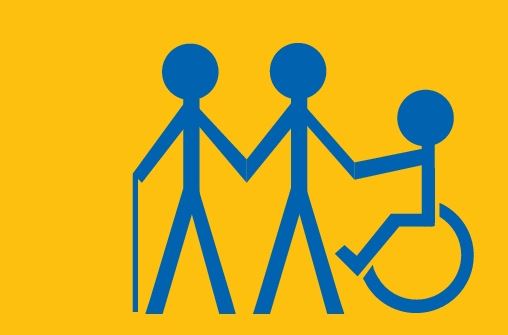
COMMENT: By Lawrence Tritschler
Will the Persons with Disabilities Act of 2014 Serve Uganda’s Disabled?
Every Monday morning I take a fifteen-minute boda ride from my flat in Bukoto to the Makerere University campus across town. Weaving through the heavy traffic that bogs down Kampala’s Wandegeya area, each week I practically come face-to-face with the same host of characters. There are the overcrowded taxis ferrying people to their places of work, the walking poor; hurriedly making their way along the crumbling sidewalks, the lone preachers hopelessly belting out fiery sermons for which no one will stop to listen, the Asian businessmen stuck in their cars, furiously honking at the constant stream of boda drivers busily threading their way through the congested mess of plodding steel, and, of course, the army of street vendors walking in and out of traffic to peddle their wares.
Scarcely visible within this human kaleidoscope, I make out a few disabled people begging at bottlenecks in traffic they’ve somehow managed to scurry to. Some are perched on tattered old wheelchairs, others simply squat on dirtied mats ¬– all are plainly desperate, jobless, and ignored.
And each week I arrive to a university campus with no infrastructure designed to accommodate students with disabilities, none of whom I’ve actually seen since I started at Makerere this September.
Yet the 2005 Constitution, in Article 32 and Section 35 contains specific legal protections for the country’s disabled. There is legislation on the books, the public-spirited Persons with Disabilities (PWDs) Act of 2006, that, at least in principle, enshrines their rights and freedoms, provides disabled people avenues for redress should they suffer discrimination and abuse, and outlines punishment for those who flout the law.
President Yoweri Museveni’s government, which includes some parliamentarians with disabilities, has recently sponsored a spate of national programs designed to provide equal opportunity and even affirmative action for its disabled citizens. And the Ugandan government has recently gone to great lengths to ensure compliance with the United Nation’s Convention on the Rights of Persons with Disabilities (UNCRPWD). Clearly, then, there is a yawning gap between the honorable intentions of the NRM government, outwardly considered with the fate of disabled Ugandans, and the stark reality that this demographic still lags behind the rest of Ugandan society fully a decade after the passage of the PWA Act.
Scanning the conference room from my seat at the PWD Dialogue at the Esella Country Hotel on Wednesday, October 26, I had hoped the parliamentarians in attendance;Paul Amoru and Andrew Kaluya, would voice the government’s plan to close this gap. Instead, each confirmed what everyone else in the room, including and especially the Persons With Disabilities who had come to represent their respective communities, already knew.
The 2006 Act, which Amoru and Kaluya admitted had been fatally flawed, was never “operationalised.” It was unclear in the Bill what, exactly, was meant by “disability,” who was so “disabled” and who was responsible for enforcing the ambiguously-worded law. Reflecting on the 2014 rendition now before parliament, which panelist Ambrose Mulangira of the Uganda National Association for the Deaf described as “not worth passing in its current form,” the politicians further admitted that even the revised Bill may also not leave the shelves.
It seems the problem in this instance is two-fold: Firstly, as both MPs candidly acknowledged, Uganda’s legislative process is too cumbersome to be genuinely responsive to the societal needs parliament is elected to serve. The recent influx of inexperienced first-term parliamentarians partly accounts for this problem, with Many MPs simply lacking the capacity to effectively engage with the public policy process entirely. The sheer inefficiency attendant with government bureaucracy is another factor, with legislative inertia setting in as Bills languish in parliament. When legislation is enacted, such as in the case of the 2006 PWD Act, the state has demonstrated a frustrating tendency not to meaningfully enforce some of the laws.
Secondly, Ugandan society pointedly lacks a national political culture wherein legislation like the proposed 2014 PWD Act would resonate. Simply put, it seems that most Ugandans would not think to bother with the law either because the state has failed to follow through with significant enforcement mechanisms, or because they are ignorant of the special needs of PWDs specifically and the social ‘good’ that comes from meeting those needs more generally.
Meanwhile, Uganda’s delegation to the UNCRPWD stressed that Entebbe International Airport and key tourist destinations throughout the country, which the vast majority of disabled Ugandans have no use for, have been retrofitted to accommodate PWDs. With the needs of disabled—and, I assume mostly foreign—jet-setters and tourists met, Amoru forthrightly conceded that even Uganda’s Government House is inaccessible by wheelchair. No doubt, the irony that Uganda has, in the name of an international convention, relegated the needs of its own disabled nationals to those of disabled mzungu will not be lost on anyone who bothers to read between the lines of the government’s international commitments. Whatever it says in the Constitution, it seems that some disabled people are more equal than others.
The PWD Dialogue was productive in the sense that it brought the concerned stake-holders together for a helpful discussion about the pitfalls in current PWD legislation and how they might be overcome. But, in absence of impactful action on the part of the state, it seems likely the 2014 PWD Bill, if passed, will go the way of the 2006 Act it was designed to replace: Parliament will pass a Bill that, even if it is vastly improved, will do nothing but gather dust. In that case, Wandegeya’s disabled beggars will still be on the streets with every passing Monday.
****
Lawrence Tritschler is an Intern at the Centre for Policy Analysis’s Parliament Watch
****
(lawrence.tritschler3@gmail.com; 0773556526)
****
editor@independent.co.ug
 The Independent Uganda: You get the Truth we Pay the Price
The Independent Uganda: You get the Truth we Pay the Price



